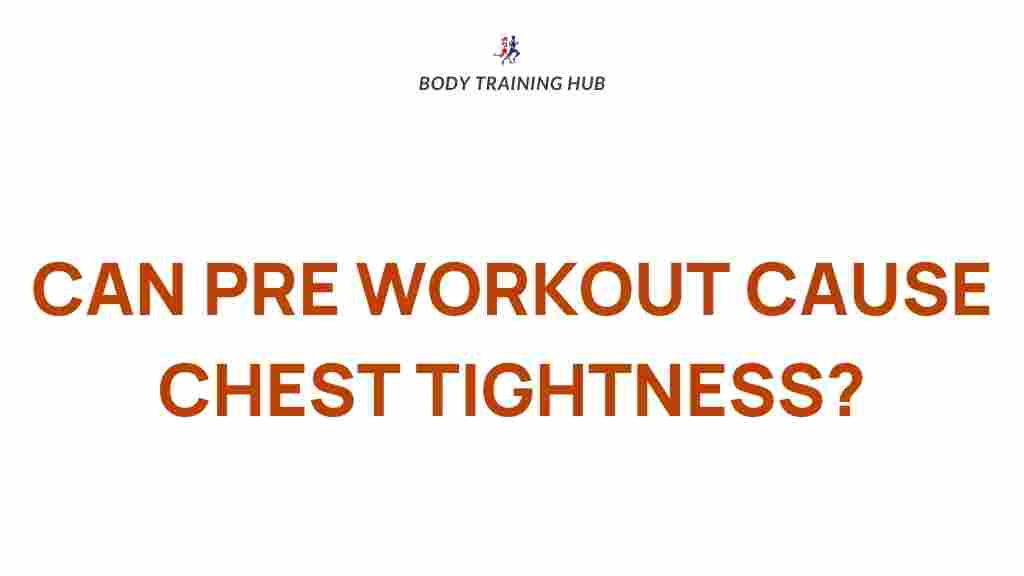Unraveling the Mystery of Pre-Workout Supplements
In the world of fitness, pre-workout supplements have gained immense popularity among athletes and fitness enthusiasts alike. These products are designed to enhance exercise performance, providing an extra boost before hitting the gym. However, with many options available and various ingredients involved, confusion often arises about the efficacy and safety of these supplements. This article aims to delve deeper into the realm of pre-workout supplements, addressing common myths, ingredients, and potential concerns such as chest tightness during exercise.
Understanding Pre-Workout Supplements
Pre-workout supplements are specifically formulated to increase energy, stamina, and overall workout performance. Typically taken 20-30 minutes before exercising, they aim to prepare the body for intense physical activity. The primary components of these supplements include:
- Caffeine: A well-known stimulant that enhances focus and energy levels.
- Beta-Alanine: An amino acid that helps reduce fatigue and increase endurance.
- Citrulline Malate: A compound that may improve blood flow and reduce muscle soreness.
- Branched-Chain Amino Acids (BCAAs): Essential for muscle recovery and reducing exercise-induced muscle damage.
- Creatine: Known to improve strength and power during high-intensity workouts.
These ingredients work synergistically to enhance various aspects of exercise performance, making them popular among serious gym-goers.
Common Myths About Pre-Workout Supplements
Despite their popularity, several myths surrounding pre-workout supplements persist. It’s essential to separate fact from fiction to make informed decisions about their use.
- Myth 1: All Pre-Workouts Are the Same
In reality, pre-workout supplements vary widely in their formulation. Some may contain high levels of stimulants, while others focus on non-stimulant ingredients. Therefore, it’s crucial to read labels and understand what you’re consuming. - Myth 2: Pre-Workouts Cause Chest Tightness
While some users report experiencing chest tightness, this is not common for everyone. Often, chest tightness can be attributed to factors such as anxiety, dehydration, or the specific ingredients used in the supplement. Always consult with a healthcare provider if you experience unusual symptoms. - Myth 3: You Need Pre-Workout to Have a Good Workout
Not true! While pre-workouts can enhance performance, they are not a necessity for everyone. Many individuals achieve great results through proper nutrition and hydration alone.
Choosing the Right Pre-Workout Supplement
With numerous options available, selecting the right pre-workout can be daunting. Consider the following steps to ensure you make the best choice for your fitness goals:
Step 1: Identify Your Goals
Are you looking to increase energy, improve endurance, or enhance strength? Different supplements cater to various objectives. Knowing your goals will help narrow down your options.
Step 2: Research Ingredients
Familiarize yourself with common ingredients in pre-workout supplements. Look for scientifically-backed components that align with your goals. For instance:
- If you need energy, seek products with caffeine.
- For endurance, consider those with beta-alanine or citrulline malate.
Step 3: Check for Allergens and Sensitivities
Always read the ingredient list for allergens or substances you may be sensitive to. If you have a history of heart issues or anxiety, consult a healthcare provider before using any stimulant-based supplements.
Step 4: Start with a Lower Dosage
If you’re new to pre-workouts, start with half the recommended dose to assess your tolerance. Gradually increase the dosage as needed.
Potential Side Effects of Pre-Workout Supplements
While many individuals enjoy the benefits of pre-workout supplements, it’s crucial to be aware of potential side effects. Some common side effects may include:
- Jitters or Anxiety: High caffeine content can cause nervousness or restlessness.
- Insomnia: Taking pre-workouts too close to bedtime can interfere with sleep.
- Digestive Issues: Some users report stomach upset or diarrhea.
- Chest Tightness: As mentioned previously, some individuals may experience this, which should be monitored closely.
If you experience severe side effects or chest tightness that persists, discontinue use and consult a healthcare professional.
Pre-Workout and Chest Tightness: Understanding the Connection
Chest tightness can be a concerning symptom, especially during exercise. While it is not a direct side effect of pre-workout supplements for everyone, it can occur in certain individuals. Here are some potential reasons for this experience:
- Stimulant Sensitivity: Some people may be more sensitive to stimulants like caffeine, leading to an increase in heart rate or blood pressure, which could result in chest tightness.
- Dehydration: Failing to hydrate properly before a workout can cause muscle cramping and tightness.
- Anxiety: The anticipation of an intense workout can sometimes trigger anxiety, leading to physical symptoms like tightness in the chest.
If you encounter chest tightness, it’s essential to listen to your body. Take a break, hydrate, and if symptoms persist, seek medical advice.
Tips for Using Pre-Workout Supplements Safely
To maximize the benefits of pre-workout supplements while minimizing risks, consider these safety tips:
- Consult with a Professional: Always consult a healthcare provider or a registered dietitian before starting any new supplement regimen.
- Stay Hydrated: Drink plenty of water before and during your workout to prevent dehydration.
- Be Mindful of Timing: Avoid taking pre-workouts late in the day to prevent sleep disturbances.
- Cycle Your Use: Consider cycling your use of pre-workouts to prevent tolerance build-up.
Conclusion
Pre-workout supplements can be an effective tool for enhancing fitness performance, but they are not without their complexities. By unraveling the mystery surrounding these supplements, individuals can make informed choices that align with their fitness goals. Understanding the ingredients, debunking myths, and recognizing potential side effects such as chest tightness are crucial steps in this process.
Ultimately, the best approach to fitness includes a balanced diet, regular exercise, and adequate hydration. Supplements can complement these efforts, but they should not replace the foundational elements of health. For more information on fitness and nutrition, explore our additional resources here.
For further reading on the science behind supplements, consider visiting this comprehensive resource here.
This article is in the category Myths & Facts and created by BodyTraining Team
